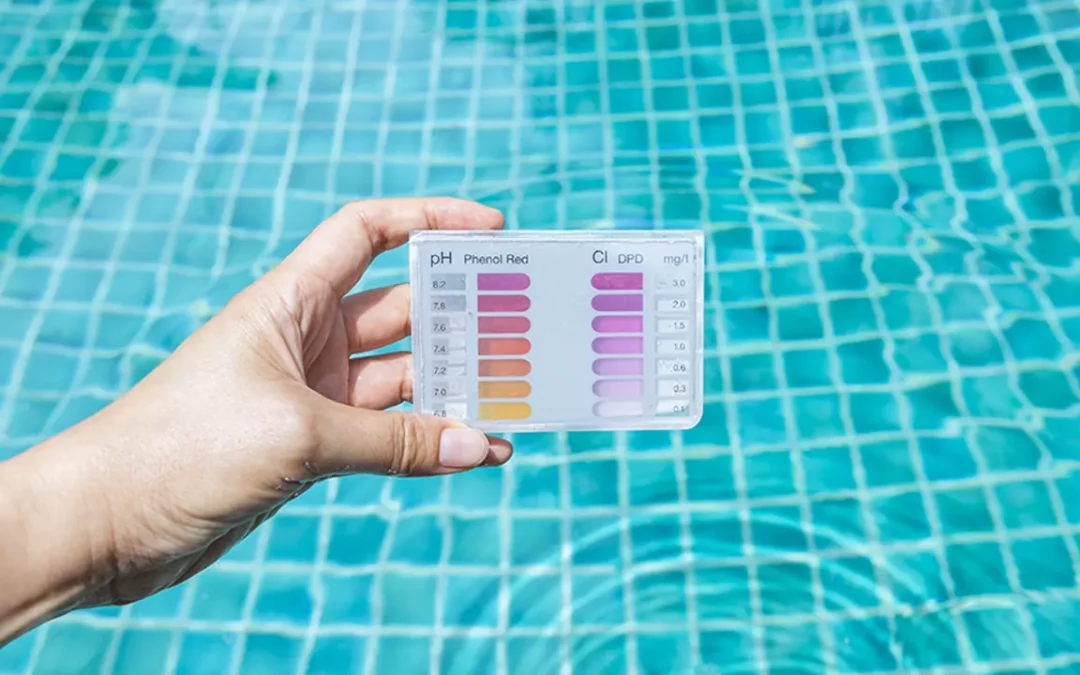Pool water chemistry is crucial for maintaining a clean and safe swimming environment. Understanding the basics of pool water chemistry can help you keep your pool sparkling and inviting. In this article, we’ll discuss some essential pool water chemistry tips to help you maintain your pool properly.
Understanding Pool Water Chemistry
Importance of Balanced Water Chemistry
Balanced water chemistry is essential for several reasons. It helps prevent the growth of algae and bacteria, keeps the water clear and clean, and protects your pool equipment from damage.
Key Parameters
There are several key parameters you need to monitor to maintain balanced water chemistry:
- pH: pH measures the acidity or alkalinity of the water. The ideal pH range for pool water is between 7.2 and 7.6.
- Chlorine: Chlorine is a disinfectant that kills bacteria and algae. The ideal chlorine level for pools is between 1 and 3 parts per million (ppm).
- Alkalinity: Alkalinity helps stabilize the pH level. The ideal alkalinity range for pools is between 80 and 120 ppm.
- Calcium Hardness: Calcium hardness measures the amount of dissolved calcium in the water. The ideal range for calcium hardness is between 200 and 400 ppm.
- Cyanuric Acid: Cyanuric acid helps stabilize chlorine and protect it from UV degradation. The ideal cyanuric acid level is between 30 and 50 ppm.
Testing Pool Water Chemistry
Testing Frequency
You should test your pool water chemistry at least once a week. However, it’s a good idea to test it more frequently, especially after heavy pool usage or rainfall.
Testing Kits
You can use test strips or liquid test kits to test your pool water chemistry. Follow the instructions on the kit carefully for accurate results.
Adjusting pH Levels
Causes of pH Imbalance
Factors such as rainfall, pool usage, and the addition of chemicals can cause pH imbalance.
How to Correct pH Levels
To raise pH, you can add sodium carbonate (soda ash). To lower pH, you can add sodium bisulfate or muriatic acid. Follow the manufacturer’s instructions when adding chemicals to your pool.
Maintaining Chlorine Levels
Role of Chlorine
Chlorine kills bacteria and algae and helps keep the water clean and safe.
Types of Chlorine
There are different types of chlorine available, including chlorine tablets, liquid chlorine, and granular chlorine. Each type has its pros and cons, so choose the one that works best for your pool.
Chlorine Dosage Calculation
To calculate the correct amount of chlorine to add to your pool, you’ll need to know the volume of your pool and the current chlorine level. Use a pool calculator to determine the correct dosage.
Balancing Alkalinity
Alkalinity’s Role
Alkalinity helps buffer pH changes and prevents rapid fluctuations in pH levels.
Adjusting Alkalinity Levels
To raise alkalinity, you can add sodium bicarbonate (baking soda). To lower alkalinity, you can add muriatic acid. Again, follow the manufacturer’s instructions when adding chemicals.
Understanding Calcium Hardness
Effects of High/Low Calcium Hardness
High calcium hardness can cause scale formation, while low calcium hardness can lead to corrosion of pool equipment.
Adjusting Calcium Hardness
To raise calcium hardness, you can add calcium chloride. To lower calcium hardness, you can partially drain and refill the pool with fresh water.
Managing Cyanuric Acid Levels
Importance of Cyanuric Acid
Cyanuric acid helps stabilize chlorine and prolong its effectiveness.
Preventing Cyanuric Acid Buildup
To prevent cyanuric acid buildup, use chlorine stabilizers sparingly and avoid using stabilized chlorine products if possible.
Other Factors Affecting Water Chemistry
Temperature
Warmer temperatures can increase the rate of chemical reactions in your pool water, so you may need to adjust your chemical dosages accordingly.
Sunlight Exposure
Sunlight can cause chlorine to degrade more quickly, so you may need to add more chlorine to maintain the proper levels.
Maintaining proper pool water chemistry is essential for keeping your pool clean, safe, and inviting. By understanding the key parameters and following these tips, you can ensure that your pool water stays balanced and healthy for swimming.
Call your local pool service company if you need your pools checked.


Recent Comments